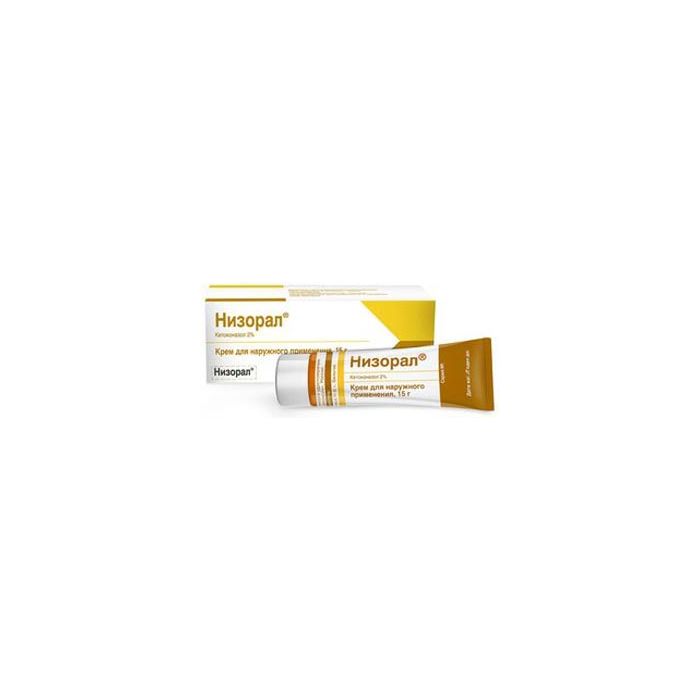Nizoral cream for external use 2% tube 15g
Category
Antifungal
Scope of the drug
Leather
Release form
Cream
Manufacturer country
Belgium
Package quantity, pcs
one
Release form, composition and packaging
Cream for external use 2% white, homogeneous.
1 g
ketoconazole 20 mg
propylene glycol - 200 mg (equiv. 193 μl), stearyl alcohol - 75 mg, cetyl alcohol - 20 mg, sorbitan stearate - 20 mg, polysorbate 60 (Tween 60) - 15 mg, isopropyl myristate - 10 mg, sodium sulfite anhydrous - 2 mg , polysorbate 80 (Tween 80) - 1 mg, purified water - up to 1 g (637 μl).
15 g - aluminum tubes (1) - cardboard packs.
pharmachologic effect
Ketoconazole is a synthetic imidazole-dioxolane derivative with fungicidal or mycostatic action against dermatophytes such as Trichophyton spp., Epidermophyton floccosum and Microsporum spp., And against yeast, especially against Malassezia spp.
Nizoral cream 2% very quickly acts on itching with dermatophyte and yeast infections, while symptomatic improvement is observed even before the first signs of recovery appear.
Pharmacokinetics
Concentrations of ketoconazole were not determined in blood plasma of adult patients after topical application to patients after topical application to the skin of 2% Nizoral cream.
In a study involving 19 children with seborrheic dermatitis, in which about 40 g of 2% Nizoral cream was applied daily to the skin surface with an area of more than 40% of the body surface, plasma concentrations of ketoconazole were determined in 5 children and ranged from 32 to 133 ng / ml.
With repeated use in children of 8 large amounts of cream (more than 3 g), there is a possibility of drug interactions inhibition of the metabolism of drugs metabolized by enzymes of the CYP3A4 system, in particular cisapride, and an increase in allergic reactions is also possible.
Indications for use
Dermatophytic skin infections caused by Trichophyton rubrum, Trichophyton mentagrophytes, Microsporum canis and Epidermophyton floccosum:
- dermatomycosis of smooth skin
- epidermophytosis inguinal
- epidermophytosis of the hands and feet
- skin candidiasis
- pityriasis versicolor
- seborrheic dermatitis caused by Pityrosporum ovale.
Contraindications for use
- known hypersensitivity to ketoconazole or any of the auxiliary components of the drug.
Dosage regimen
Skin candidiasis, dermatomycosis of smooth skin, inguinal epidermophytosis, epidermophytosis of the hands and feet, pityriasis versicolor: it is recommended to apply Nizoral cream once a day to the affected skin and the area immediately adjacent to it.
Seborrheic dermatitis: Nizoral cream is applied to the affected area 1 or 2 times a day, depending on the severity of the lesion.
Treatment should be continued for a sufficient period of time, at least for several days after the disappearance of all symptoms of the disease.
The diagnosis should be revised if there is no clinical improvement after 4 weeks of treatment.
General hygiene measures should be followed to control sources of infection and reinfection.
The usual duration of treatment is as follows: pityriasis versicolor - 2-3 weeks, yeast infections - 2-3 weeks, epidermophytosis groin - 2-4 weeks, smooth skin ringworm - 3-4 weeks, athlete's foot - 4-6 weeks.
The usual duration of treatment for seborrheic dermatitis is 2-4 weeks.
For maintenance therapy for seborrheic dermatitis, the cream is applied 1 or 2 times a week.
Overdose
Excessive use of the cream can lead to erythema, edema and burning sensation, which usually disappear after stopping therapy.
If accidentally swallowed, no action is required.
Side effect
Irritation and burning sensation.
Rarely - local skin manifestations of an allergic nature, such as contact dermatitis, caused by the active component of the cream - ketoconazole or one of the auxiliary components - sodium sulfite or propylene glycol.
Side effects
Name ENG
NIZORAL
Clinical and pharmacological group
Antifungal drug for external use
ATX code
Ketoconazole
Dosage
2% x 15g
Structure
1 g of cream contains: Active ingredient: ketoconazole 20 mg
Excipients: propylene glycol, stearyl alcohol, cetyl alcohol, sorbitan stearate, polysorbate 60, polysorbate 80, isopropyl myristate, sodium sulfite anhydrous, purified water.
Indications
Dermatophytic skin infections caused by Trichophyton rubrum, Trichophyton mentagrophytes, Microsporum canis and Epidermophyton floccosum:
dermatomycosis of smooth skin,
epidermophytosis inguinal,
epidermophytosis of the hands and feet,
Skin candidiasis
Pityriasis versicolor
Seborrheic dermatitis due to Pityrosporum ovale.
Storage conditions and periods
At a temperature of 15-30 degrees.
Expiration date: 3 years
Contraindications
Hypersensitivity to drug components.
INN / Active ingredient
ketoconazole
Specifications
Category
Antifungal
Scope of the drug
Leather
Release form
Cream
Manufacturer country
Belgium
Package quantity, pcs
one
Way of introduction
On the skin
Vacation conditions
Without recipe
Brand name
Nizoral
The amount of the dosage form in the primary package
15 g
Primary packaging type
Tuba
Type of consumer packaging
Pack of cardboard
Pharmaco-therapeutic group
Antifungal agent
Anatomical and therapeutic characteristics
D01AC08 Ketoconazole
Dosage form
Cream for external use
Dosage (volume) of the substance in the preparation
ketoconazole 20 mg
Expiration date in days
1095
The target audience
Adult
Package weight, g
25
Mode of application
:
Outwardly. < br> Candidiasis of the skin, dermatomycosis of smooth skin, inguinal epidermophytosis, epidermophytosis of the hands and feet, pityriasis versicolor: the cream is applied once a day to the affected skin and the area immediately adjacent to it. < br> Seborrheic dermatitis: the cream is applied to the affected area 1 or 2 times a day, depending on the severity of the lesion. For maintenance therapy - 1 or 2 times a week. < br> Treatment should be continued for a sufficient period of time, at least for several days after the disappearance of all symptoms of the disease. The diagnosis should be re-evaluated if there is no clinical improvement after 4 weeks of treatment. General hygiene measures should be followed to control sources of infection and reinfection. < br> The usual duration of treatment: pityriasis versicolor - 2–3 weeks, candidiasis of the skin - 2–3 weeks,epidermophytosis inguinal - 2-4 weeks, smooth skin dermatomycosis - 3-4 weeks, athlete's foot - 4-6 weeks seborrheic dermatitis - 2-4 weeks.
Information on technical characteristics, delivery set, country of manufacture

